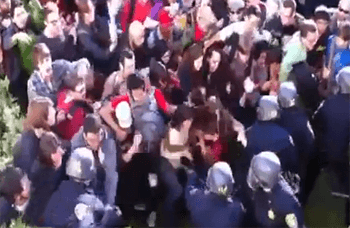Blow to Free Speech: UC Berkeley Chancellor Invited Use of Force Against Student Protesters
Page Media

Political protest and vigorous debate are vital elements of a healthy democracy and essential attributes of university communities in particular. A university is, after all, a community of ideas, and so universities should be especially welcoming of protest and dissent. For that reason, we found it shocking and disappointing when UC Berkeley responded to peaceful student protesters last fall with baton blows. Even more troubling, the ACLU-NC recently obtained emails in response to a Public Records Act request that show that the police conduct that day was authorized at the very highest levels of the University.
To recap the undisputed events of Nov. 9, 2011, students had organized a campus-wide day of action to focus attention on budget cuts, the need for affordable higher education, and the connections between issues affecting students at the University of California, the nationwide Occupy movement. Events included a wide range of peaceful, expressive activity on pressing political issues of the day. They were marred by not one but two rounds of baton beatings, in which riot-clad law enforcement beat students and faculty who had peacefully assembled around tents pitched on the University’s central plaza, just north of the steps named for Free Speech Movement icon Mario Savio. The first baton beatings occurred in the afternoon, between approximately 3 and 4 p.m., followed by another round that evening.
While public messages issued by the chancellor in the days after the beatings acknowledge that he had been in some contact from abroad, they suggest that his role was merely one of a passive recipient of information. Email correspondence between Chancellor Birgeneau and Vice-Chancellor Breslauer on Nov. 9, after the first but before the second round of police beatings, paints a different picture.
According to one email exchange, Vice-Chancellor Breslauer wrote to the chancellor at 4:28 p.m. on Nov. 9, after the first skirmish, stating:
Protesters locked arms to prevent police from getting to the tents. Police used batons to gain access to the tents. There are still 200-300 people gathered, watching, and, in some cases, screaming at the police...
Within the hour, Chancellor Birgeneau wrote back:
This is really unfortunate. However, our policies are absolutely clear. Obviously this group want[ed] exactly such a confrontation.
Chancellor Birgeneau then wrote back again, at 5:36 p.m. Pacific time, approximately an hour after receiving the initial email, stating:
It is critical that we do not back down on our no encampment policy. Otherwise, we will end up in Quan land.
After this email exchange, law enforcement moved in on the protesters for the second round of beatings.
This email exchange shows that Chancellor Birgeneau was informed that police “used batons” in the afternoon exchange, did not question the need for force, did not inquire whether other non-violent alternatives had or could have been explored, and instead ratified the afternoon exchange as unfortunate but necessary. (It is possible there were other communications in which he raised these questions, but if so, the University has not yet provided them to us.)
Equally troubling is Chancellor Birgeneau’s statement: “It is critical that we do not back down on our no encampment policy.” Because he knew that police had used batons to take down the tents once, this statement reads like a firm directive to take down any further tents, using batons or whatever other means might be necessary to effectuate that goal. And indeed, that is precisely what occurred later that evening.
This exchange confirms our deepest concerns – that the University treated the Occupy Cal protests like a dire threat that justified the use of baton-wielding riot police, and failed to assess the situation on the ground objectively and recognize it for what it was – a large assembly of students engaged in peaceful protest over critical issues of the day. Equally troubling is that the mistake was made at the highest levels of the University’s leadership. While individual officers were certainly involved, the decision and directive to enforce the University’s “no encampment” rule, whatever the cost, was made by the chancellor himself.
We have shared this with the Berkeley Police Review Board, which is currently conducting an investigation into the matter. (Letter to the PRB.)
The University should not emerge from this episode by pointing to one or two rogue officers and calling the problem solved. In addition to substantially revising policies on free speech, protest, crowd control, and use of force, which we have asked the University to do system-wide, the University must additionally take affirmative steps to bring its practice – at all levels of the institution – in line with its ideals, so that it treats protests as a vital contribution, and not a threat, to the lifeblood of the University.
Legal documents:
ACLU-NC Letter to UC Berkeley Police Review Board (Feb. 21, 2012)
Response to ACLU-NC Public Records Request from UC Berkeley
ACLU-NC Letter re UC Systemwide Review (Feb. 10, 2012)
Linda Lye is a staff attorney with the ACLU of Northern California.
